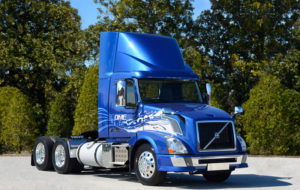Mack Goes All In With Alternative to Diesel Fuel: DME
 Technology is progressing at an ever increasing rate. The future is now! It seems you can’t go a day without reading about robots, self driving cars or even the new Hyperloop projects which will transport people hundreds of miles in mere minutes. Many of those in the automotive and transportation sectors believe diesel engines best days are behind them. A team of scientists however believe there is still use left for the diesel engines in the world of tomorrow.
Technology is progressing at an ever increasing rate. The future is now! It seems you can’t go a day without reading about robots, self driving cars or even the new Hyperloop projects which will transport people hundreds of miles in mere minutes. Many of those in the automotive and transportation sectors believe diesel engines best days are behind them. A team of scientists however believe there is still use left for the diesel engines in the world of tomorrow.
A team of researchers at Queen’s University in Belfast, Ireland are working on a different fuel source for the engines known as Dimethyl Ether (DME). DME is a biofuel derived from methane. Methane is commonly captured from decomposing organic material, agriculture, waste and coal and reused as a fuel source. DME is viewed as a clean diesel fuel source and will be able to be used with existing diesel engines.
The problem with electric or hydrogen based engines is that every truck, bus or agriculture vehicle would have to replace or adapt its existing engine. This wouldn't be the first massive change to diesel engine design. Manufactures were forced to re-engineer diesel engines with emissions abatement technology in the late 1990s. Fortunately, the EPA Tier Regulations first brought forth in 1994, offered a gradual approach to reducing emissions regulations over a period of 30 years, thus allowing manufactures time to perfect the technology. Older less efficient diesel engines currently in use were allowed to be grandfathered in.
The use of DME as a fuel source could be the solution the to the emissions problem without sacrificing horsepower, torque or costly maintenance repairs. The transition to DME would be fairly simple for manufacturers who will be able to adapt current technology of existing motors rather than design a new engine from scratch. Photo Credit Obreon Fuels®
Photo Credit Obreon Fuels®
Diesel fuel has always had a bit of an image problem due to the emissions the engines create. Just recently China vowed to ban the use of diesel engines in the coming years. Europe is also on board with the UK and France introducing a plan to phase out both new diesel and gas engine manufacturing starting in the year 2040. India, not wanting to be left behind, announced they are committing $2 billion to developing second hand biofuels. All countries are looking towards alternative fuels as demand for energy grows and supply diminish.
Mr. Ahmed Osman, a scientist, working on the DME project at Queen’s University, stated, "Diesel fuel is finite and the world will eventually run out of oil and gas, quite possibly, by the second half of this century. As a result, there is a real need for clean renewable energy sources.”
DME produces virtually no toxins, unlike fossil fuels. The new fuel source is also incredibly easy to store and transport as its natural state is a gas much like propane. However, it can also be stored as liquid for filling stations. Mr. Ahmed believe that DME has limitless possibilities including a heating and cooking oil replacement, transportation fuel or used in mass quantities for power generation.
DME is not a new product but has been around for decades, mostly in use as a propellant. During the 1990s when CFCs were banned, DME gasses were uses as a suitable replacement in aerosol containers. Some countries such as Brazil, Egypt, Japan, Korea and Japan have used it for energy as well. There is no smoke or fumes with DME and can be produced from renewable sources such as food waste in landfills.
Nobody knows what the future will hold for diesel. Prolific diesel engine manufacturer, Cummins Inc., is hedging their bets by developing electric engine technology of their own. Just a few weeks ago they were the first company to introduce the very first electric powered semi-truck. While many companies are putting their money into electric powered research others are not quite ready to abandon diesel technology. US based Obreon Fuels is one such company that is banking its future on the diesel engine and DME. Photo Caption Mack Volvo®
Photo Caption Mack Volvo®
President of Obreon Fuels, Rebecca Boudreaux, believes that diesel will be here to stay. She stated, “Compression engines are extremely powerful which is why they have been used around the world for a very long time. DME behaves just like diesel in these engines.” Where diesel has an advantage over gas or electric engines is the greater potential energy stored in the fuel. The more energy available for compression means the greater torque generated for pulling heavy loads. Diesel will always be the fuel of choice for fuel efficiency and trucking.
The commitment to alternative fuel sources has grown increasingly from a back burner idea just a few years ago to a full fledged movement within the automotive industry. The Big 3 Automakers have been tinkering around with alternative fuels for roughly 10-15 years but only now have the prototypes moved into actual production. Mack Trucks is one of the companies with eye on the future.
For over 100 years Mack has been producing “tough as nails” diesel engines and heavy duty off-road industrial equipment. Over that time period they have seen their fair share of changes in the market. Mack Trucks was acquired by Volvo in 2000 but still produces trucks in conjunction with Volvo. The company is enthusiastic about DME and began testing the fuel with Obreon Fuels this year. The companies partnered up with New York City’s Department of Sanitation to test DME fuel in its fleet of Mack Pinnacle Trucks. The data gathered will help the companies develop a fuel and engine that runs optimally for both on-road and off-road applications.
Director of Product Strategy at Mack Trucks, Roy Horton, believes diesel engines will be around for a long time and are excited about the use of the DME with existing technology. Mr. Horton stated, “Our long-term outlook on diesel is that it will still be around for many years to come, and regarding the engine development, we have proven that the engine technology is capable.”
DME is certainly an exciting opportunity for the diesel engine industry and only time will tell if this fuel source could be the next big thing for the industry.




